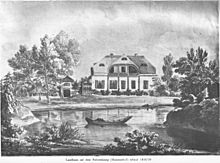Jean Dauphin de Chapeaurouge
Jean Dauphin de Chapeaurouge (also: Dauphin Jean , born January 4, 1770 in Hamburg ; † January 26, 1827 in Neuilly-sur-Seine ) was a German merchant and first deputy mayor of Hamburg from 1811 to 1813 .
Life
Chapeaurouge came from the Chapeaurouge family , who had lived in Geneva since the 15th century . His father Jaques de Chapeaurouge immigrated to Hamburg in 1764 and soon after acquired citizenship there. Like him, Jean Dauphin also completed a commercial apprenticeship and founded the trading company De Chapeaurouge & Co. in 1799 together with his younger brother and two brothers-in-law, who also immigrated from Switzerland , and which existed with interruptions until 1895.
As a member of the Reformed congregation, long excluded from political office, de Chapeaurouge was given the opportunity to take responsibility for his hometown in 1811 - after Hamburg was annexed to the French Empire : under the mayor Amandus Augustus Abendroth , who was appointed by the French , he was first deputy Mayor (Premier Maire adjoint) and remained so until the withdrawal of the French in 1813. After that, he first moved to Switzerland, but then joined the one from Johann Smidt (Bremen), Johann Friedrich Hach (Lübeck) and Johann Michael Gries (Hamburg ) existing "Hanseatic Deputation". This followed the Allied headquarters to Paris, in order to convey to the princes and envoys gathered there the “desiderata” of the three Hanseatic cities for the political reorganization after the end of Napoleon .
In 1814 he returned to Hamburg with his wife and children and began rebuilding his company and his Hammer country estate, which was burned down by the French . From 1816 to 1823 he held political offices again, for example he was a member of the finance deputation and the port and shipping deputation; since 1821 he was also the elder of the Reformed community in Hamburg.
De Chapeaurouge spent most of the last years of his life in Paris, where his company had opened a branch in 1819. In the local cemetery Pere Lachaise , he was buried.
Hammer yard
When his father died in 1805, de Chapeaurouge inherited the “ Hammer Hof ” estate, along with other properties . In the winter of siege in 1813/14, this was burned down by the French troops under Marshal Davout to create a clear field of fire against the advancing Russians under General Tettenborn . Jean Dauphin hired the young architect Alexis de Chateauneuf for the reconstruction . After Chapeaurouges death, the estate passed into the possession of his son-in-law Karl Sieveking , who had married his daughter Caroline Henriette (1797-1858) in 1823.
literature
- Georg Herman Sieveking : The history of the Hammerhof , Bd. 1, Hamburg 1899.
- Helmut Stubbe da Luz : Chapeaurouge, Jean Dauphin de . In: Franklin Kopitzsch, Dirk Brietzke (Hrsg.): Hamburgische Biographie . tape 5 . Wallstein, Göttingen 2010, ISBN 978-3-8353-0640-0 , p. 78-80 .
Individual evidence
- ↑ Dominique Torrione-Vouilloz / KMG: Chapeaurouge, de [de Pileo Rubeo]. In: Historical Lexicon of Switzerland .
- ^ GH Sieveking: The history of the Hammerhof , vol. 1, p. 111 ff.
- ↑ Hamburgische Biographie 5, p. 79.
- ↑ Hamburgische Biographie 5, p. 79.
| personal data | |
|---|---|
| SURNAME | Chapeaurouge, Jean Dauphin de |
| ALTERNATIVE NAMES | Chapeaurouge, Dauphin Jean de; Chapeaurouge, Johann de; Chapeaurouge, Johannes de |
| BRIEF DESCRIPTION | German merchant and mayor |
| DATE OF BIRTH | January 4, 1770 |
| PLACE OF BIRTH | Hamburg |
| DATE OF DEATH | January 26, 1827 |
| Place of death | Neuilly-sur-Seine |

